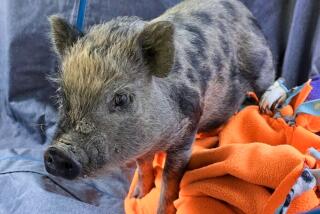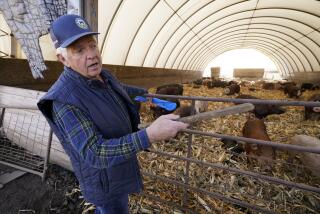Haven for a Fallen Favorite
- Share via
A decade ago, pot-bellied pigs were the hottest boutique pets for the well-heeled animal lover. At $10,000 each, they could take a bite out of the household budget, but it was worth it to see the looks on neighbors’ faces when the owner took the pig for a walk.
Today, you can drive down the street and see signs for free pot-bellies.
In between lies a cautionary tale of a pet phenomenon that has crashed harder than a dot-com stock. Left in its wake are disillusioned pet owners, abandoned and mistreated pigs and rescue centers struggling to pay their bills and find homes for castoff porkers.
“My phone rings off the hook” with people getting rid of their pigs, said Sue Parkinson, who owns Lil’ Orphan Hammies in Solvang, one of the oldest pig sanctuaries in the nation.
Four years ago, Parkinson had 50 pigs at her 5-acre ranch. Now, said the part-time waitress and full-time “pig lady,” she has almost 200, including 16 picked up in Pomona recently.
She travels hundreds of miles to rescue unwanted porkers and hauls around 4,000 pounds of pig feed a month for her herd.
Although pot-bellies imported from Southeast Asia brought high prices a decade ago, the money has gone out of the trade. With it have gone the most professional breeders. They have been replaced by “backyard breeders” who sell pigs for $5 or even give them away.
The new breeders also make extravagant claims, such as the canard that a pig won’t grow larger than a dog. “ ‘Micro-minis’ is the new term,” said Marty Fast, Parkinson’s partner in the rescue mission, who lives in Ojai.
The animals easily grow to 150 pounds, Fast said, and some hit 250.
Today’s low prices have made pot-bellies an impulse buy, like ducks and chicks at Easter. The owners don’t necessarily have the money or the long-term interest to deal with a big, smart, hungry animal. With an appetite for drywall and linoleum, they can literally eat their owners out of house and home.
Owners unprepared to deal with all this often starve or abandon the pigs. If they are more conscientious, they call a sanctuary. But rescuers are having trouble keeping up with demand.
“I don’t know one sanctuary that’s not hurting financially,” said Richard Hoyle, 53, who houses 154 pigs on 17 acres in Culpeper, Va.
“It’s worse now because people that did care about pigs are out” of the business, added Parkinson, 45.
She told of a Florida man whose ambition was to create the nation’s largest sanctuary. He had 500 pot-bellies when his wife fell ill and he couldn’t keep the pigs.
“What we’re doing . . . is cleaning up after rescuers,” Parkinson said. She is now trying to organize reputable sanctuaries to help struggling operators.
Unlike other pet organizations, pig sanctuaries have trouble obtaining corporate help because pigs are considered livestock. Hoyle has tried and failed numerous times. That puts more pressure on a few dedicated pig lovers like Parkinson.
It’s been a lifelong passion for her. She grew up in Lompoc as the kid with the exotic pets. She raised ferrets and rescued rats from high school biology class.
“I was an only child,” she said. “I always took in injured animals.”
She got her first pig a decade ago, when she found one at a swap meet for $250, then a good price. Things grew from there. She soon had “12, 13, 14. What’s one more? Twenty, 30.”
Today, she has a grant and a nonprofit organization and a board of directors behind her. When the Ventura County Sheriff’s Department closed its pig-slaughtering operation at the jail’s farm last year, she obtained several of its sheds.
Parkinson’s first brush with notoriety came several years ago, when she appeared on a PBS Nature series episode called “The Joy of Pigs.” Friends teased her for saying she’d rather “kiss my pigs than my husband.”
(She and her husband are separated, but not because of her joke. “We’re still best friends,” she said.)
The show made her a local celebrity. Today, she is frequently seen at the wheel of her Squeal Mobile, a motorized pink cart that bears her Lil’ Orphan Hammies logo.
Often riding on the back is the mascot, Lucky, rescued by Parkinson after its ears were torn off by dogs. “I won’t place a pig with someone who has dogs,” she said.
So what is it about pigs? “They’re all so individual,” Parkinson said. “Each pig has a different personality.”
They also tend to regard humans as equals, which can be a problem for a family that wants a fawning fur ball by the fireplace. “Pigs are not at the top of the list of adoptable animals,” Fast said.
For one thing, they have a tendency to charge people at first to establish dominance. “Some trainers say to give them a time-out,” scoffed Parkinson. “I give them ice cream” to calm them down and make them feel loved.
Fast admires the pigs’ intelligence. “My first one shook hands. It could speak and retrieve,” she said. “Susie has a dog trainer teaching them to strum guitars and put balls through a hoop. I told her she should go on Letterman.”
More to Read
Sign up for Essential California
The most important California stories and recommendations in your inbox every morning.
You may occasionally receive promotional content from the Los Angeles Times.










